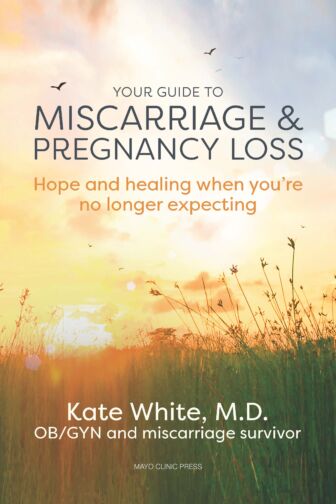
“[A] comprehensive and comforting debut… Her gentle yet precise language will be a balm.” Publishers Weekly
Miscarriage affects almost 1 million people every year in the United States and doesn’t discriminate. Yet each person experiencing the loss of a pregnancy often feels alone, full of questions about the process and the aftermath. And today’s healthcare system is simply not designed to shepherd a patient and their family through the loss with the information and understanding they need. Patients need an experienced hand to help them through one of the most painful experiences of their lives. This book is that guide.
Your Guide to Miscarriage and Pregnancy Loss takes you through the journey of miscarriage diagnosis and treatment. It addresses all types of pregnancy loss, including ones that are not mentioned in the media or by other books. It combines a comprehensive medical approach to miscarriage care with a compassionate exploration of the physical and emotional aftermath of pregnancy loss. Filled with accessible information, frequently asked questions and answers, and methods for coping, the book empowers people undergoing pregnancy loss to take control over their experience and provides hope for their future pregnancy efforts.
Part One. Preparing
- Understanding Miscarriage: Why Did This Happen?
- Getting the Diagnosis
- Choosing Your Path: Options for Treatment
Part Two. Experiencing
- First-, Second-, and Third-Trimester Miscarriage
- Recurrent Pregnancy Loss
- Ectopic and Molar Pregnancy
- Termination for Maternal Health or Fetal Anomalies
- Ambivalence and Loss
Part Three. Healing
- What to Expect When You’re No Longer Expecting
- Managing Grief
- Everyone Else
- Ways to Remember
- Getting Pregnant Again
The book includes lists of questions at the end of each chapter, that can help you start a conversation with your doctor about what lies ahead for you. Every miscarriage is different, but there are similarities to patients’ experiences for every type of miscarriage.
Throughout the book, I share my own experiences of miscarriage—a traumatic stillbirth at 29 weeks and a first-trimester loss at 5 weeks. I hope that my stories validate your feelings, and make you feel a little less alone.
Find resources including contact information for pregnancy loss organizations; books about pregnancy loss and grieving; links to articles that discuss pregnancy loss; and a glossary for every medical term used in the book.
You are not alone—a legion of others, including me, have walked this path before you, and our experiences can guide you along your way.
- Boston Globe, Parenting Unfiltered. “Let’s Talk About Miscarriage.”
- TODAY.com. “OB-GYN shares 9 lessons she learned about loss after daughter was stillborn.”
- Giddy. “We Need to Talk More About Stillbirths.”
- Giddy. “Miscarriage Comes in Many Forms.”
- Giddy. “The Grief and Joy of Pregnancy After a Miscarriage.”
- Mayo Clinic Press. My book introduction.
- Good Grief with Cheryl Jones. “Miscarriage and Loss.”
- The Egg Whisperer Show. “Hope and Healing After Pregnancy Loss with Dr. Kate White.”
- Dr. Jay Warren. “Miscarriage and Pregnancy Loss with Dr. Kate White, OB/GYN.”



